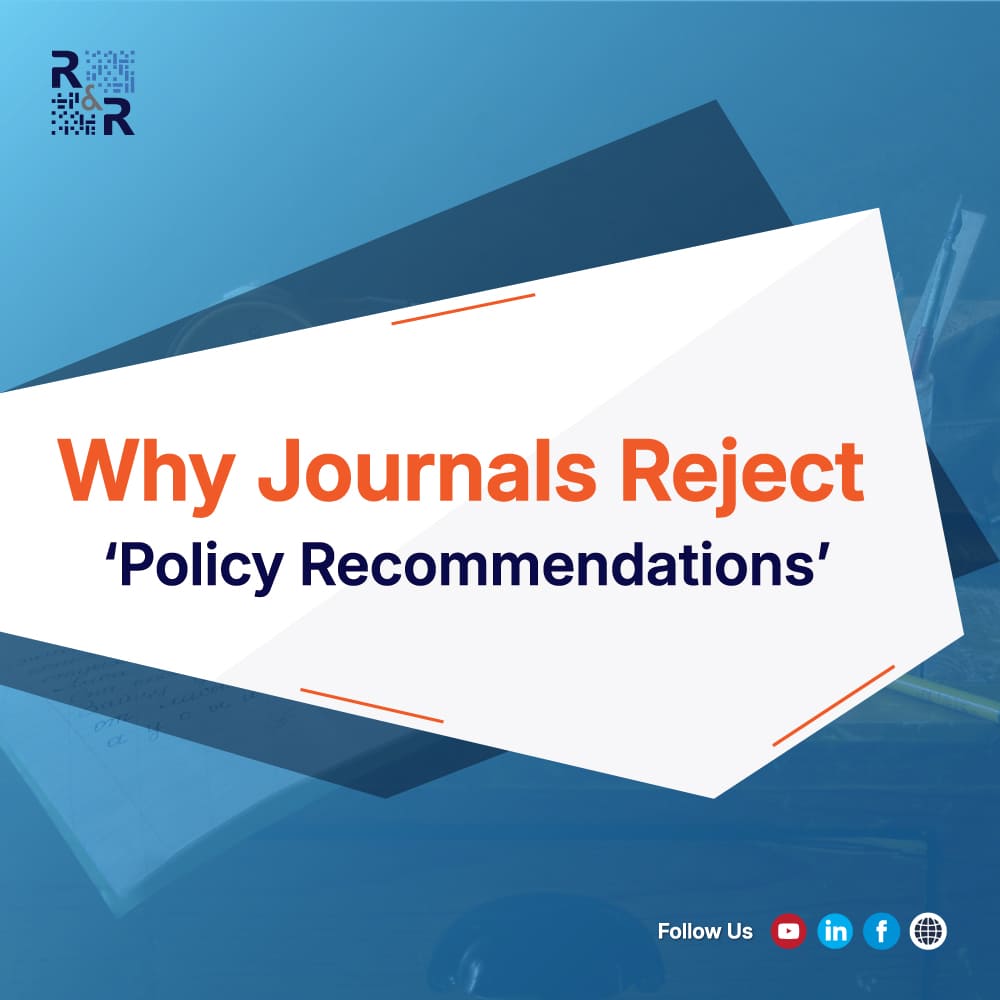Publishing in top-tier journals is a demanding process. Researchers invest months collecting data, analyzing results, and drafting manuscripts. Yet many papers face rejection not because of weak evidence but because their policy recommendations fall short.
At Research & Report Consulting (RRC), we have reviewed hundreds of manuscripts and noticed a recurring pattern: recommendations often fail to meet journal standards. This article unpacks the main reasons—and how to overcome them.
1. Recommendations Not Grounded in Evidence
One of the most common reasons for rejection is when recommendations feel disconnected from findings. Journals expect a direct line between results and policy implications.
- Example: If regression analysis shows gender gaps in education, the policy suggestion should address gender-specific interventions—not just a generic call to “improve education.”
Tip: Always link recommendations directly to your study’s findings.
2. Lack of Feasibility and Context
Policy advice must consider political, institutional, and economic realities. Overly ambitious or idealistic recommendations weaken credibility.
- Example: Suggesting nationwide healthcare reform in a low-resource setting without acknowledging limitations signals a lack of realism.
Tip: Ask: Can this realistically be implemented in my context?
3. Missing the Analytical Bridge
Editors want to see how data transitions into recommendations. Without this analytical bridge, advice appears speculative.
Formula to follow:
Finding → Interpretation → Policy Implication.
Tip: Explicitly connect results to recommendations in your discussion section.
4. Advocacy Without Analysis
Journals reject activist-style slogans disguised as recommendations. Statements like “Governments should prioritize sustainability” fail without data-driven justification.
Tip: Frame recommendations as implications, not commands. Use phrases like “Findings suggest policymakers may need to consider…”
5. Ignoring Multi-Level Governance
Policy is rarely controlled by one actor. Many manuscripts wrongly assume that “the government” alone is responsible.
- Example: Climate adaptation may involve local councils, NGOs, and international donors—not just central government.
Tip: Identify who should act: ministries, local authorities, private sector, or civil society.
6. Overlooking Unintended Consequences
Top journals expect nuanced thinking. Recommendations that ignore risks or trade-offs appear incomplete.
Tip: Strengthen credibility by noting possible side effects and monitoring mechanisms.
7. Absence of Stakeholder Linkage
Recommendations resonate more when linked to specific stakeholders. Without this, readers may not know who the advice targets.
Tip: Align recommendations with policymakers, practitioners, or communities.
How Research & Report Consulting Supports Authors
At RRC, we help researchers create recommendations that survive peer review:
- Research Design & Data Analysis – Ensuring evidence robustness.
- Policy Translation Support – Converting results into journal-ready advice.
- Stakeholder Mapping – Identifying realistic actors and responsibilities.
- Manuscript Review – Aligning with top journal expectations.
Our goal is not just publication—but impactful scholarship that influences policy.
Conclusion
Policy recommendations are more than an afterthought. They are a litmus test for a manuscript’s credibility. Journals want recommendations that are:
- Evidence-based
- Feasible in context
- Linked directly to findings
- Analytical, not normative
- Governance-aware
- Risk-sensitive
- Stakeholder-focused
At RRC, we bridge research and policy practice to help authors publish with confidence.
Question for Readers:
Have you ever had feedback on weak policy recommendations in peer review? How did you improve them?

